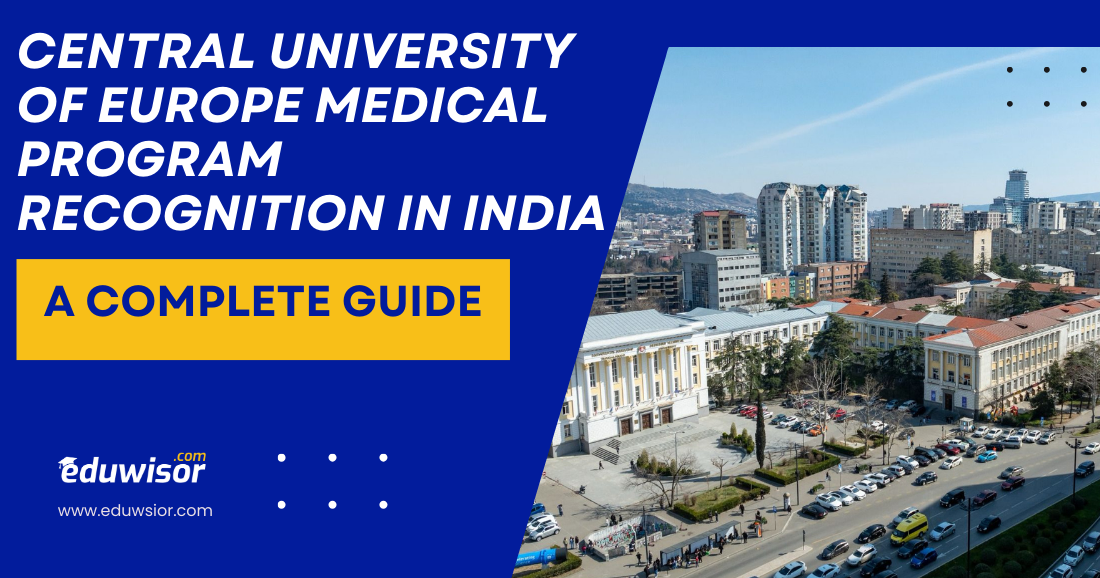Introduction
Pursuing a medical degree abroad is a dream for many Indian students, especially with increasing competition for limited MBBS seats in India. The Central University of Europe (CUE) has emerged as a popular choice due to its high-quality education and affordable fees. However, before enrolling, Indian students must ensure that the CUE medical program is recognized in India by the National Medical Commission (NMC) (formerly MCI).
This guide covers everything you need to know about the recognition of Central University of Europe’s medical program in India, including NMC approval, eligibility criteria, and career prospects.
Is Central University of Europe’s Medical Program Recognized in India?
The most critical factor for Indian students is whether their degree will be valid in India. Here’s what you need to know:
1. NMC Recognition Status
The National Medical Commission (NMC) maintains a list of approved foreign medical universities. As of 2024, the Central University of Europe is not listed among NMC-recognized institutions. This means:
- Indian students graduating from CUE cannot practice medicine in India without clearing the Foreign Medical Graduates Examination (FMGE).
- If the university later gets NMC approval, graduates may benefit from automatic recognition.
2. WHO & ECFMG Recognition
While NMC recognition is pending, CUE is listed in the World Directory of Medical Schools (WDOMS), meaning:
- Graduates can practice in other countries that accept WDOMS-listed degrees.
- Eligibility for USMLE (United States) and PLAB (UK) exams if additional requirements are met.
Why Do Indian Students Choose Central University of Europe for MBBS?
Despite the NMC recognition issue, many Indian students opt for CUE due to:
1. Affordable Tuition Fees
Compared to private Indian medical colleges, CUE offers lower tuition fees (approx. €6,000–€10,000 per year).
2. English-Taught Programs
No language barrier, as the MBBS program is taught entirely in English.
3. High-Quality Education & EU Standards
CUE follows the European Credit Transfer System (ECTS), ensuring globally competitive medical training.
4. Clinical Exposure in Europe
Students gain hands-on experience in EU hospitals, enhancing their practical skills.
5. No Donation or High-Capitation Fees
Unlike many Indian private colleges, CUE has a transparent fee structure.
Challenges for Indian Students
1. FMGE Passing Requirement
Since CUE is not NMC-approved, graduates must pass the FMGE (now NEXT exam) to practice in India. The pass rate is historically low (~15-20%).
2. Limited Internship Opportunities in India
Without NMC recognition, securing internships in India may be difficult.
3. Visa & Residency Issues
Post-graduation, students may face challenges obtaining medical residency in EU countries unless they meet additional licensing criteria.
Alternative NMC-Approved Central University of Europe
If NMC recognition is a priority, consider these approved European medical schools:
- Charles University (Czech Republic)
- University of Debrecen (Hungary)
- Semmelweis University (Hungary)
- Jagiellonian University (Poland)
- Medical University of Lodz (Poland)
Career Prospects After Studying at Central University of Europe
1. Practicing Abroad
- Work in EU countries after clearing respective licensing exams.
- Opportunities in the UK (PLAB), USA (USMLE), or Middle East.
2. Higher Studies & Research
Pursue MD/MS or PhD programs in Europe or other countries.
3. Returning to India
- Clear FMGE/NEXT to practice.
- Work in private hospitals or healthcare startups.
Conclusion
While the Central University of Europe offers a quality medical education, its lack of NMC recognition is a major drawback for Indian students aiming to practice in India. Before enrolling, weigh the pros and cons carefully. If practicing in India is your goal, consider NMC-approved European universities instead.
Eduwisor always guides students toward the right path with an unbiased approach. You can follow us on Youtube, Facebook, Instagram, Twitter, and Linkedin. Stay tuned for regular updates.




